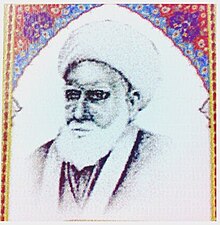| This article needs additional citations for verification. Please help improve this article by adding citations to reliable sources. Unsourced material may be challenged and removed. Find sources: "Ali Asghar Mazandarani" – news · newspapers · books · scholar · JSTOR (March 2014) (Learn how and when to remove this message) |
| Ali Asghar Mazandarani | |
|---|---|
 | |
| Title | Ayatollah |
| Personal life | |
| Born | 1826 |
| Died | 1911 (aged 84–85) |
| Era | Modern era |
| Main interest(s) | Fiqh |
| Occupation | Muslim scholar |
| Religious life | |
| Religion | Islam |
| Jurisprudence | Usuli Twelver Shia |
| Creed | Jafari jurisprudence |
Grand Ayatollah Ali Asghar Mazandarani (Persian: علیاصغر مازندرانی; 1826–1911) was an Iranian cleric originally from Amirkola. He was a spiritual guide for many Shia Muslims.
Life
Mazandarani was educated in formal Islamic studies at Mirza Habibolah Rashti, Mola Esmaeil Borojerdi, Mohammad Ashrafi, Mohammad-Kazem Khorasani, and the Mirza Hosein khalili Tehrani seminary in Najaf. After completing his studies, he returned to Amirkola and Babol in Mazandaran and was responsible for religious affairs there.
Death
Mazandarani died in 1911. After his death, the Babol Amirkola city markets were closed, and people wore black in mourning. Mazandarani was buried in the Garden of Rizwan. His tomb was destroyed in Reza Khan age, but later repaired by Mazandarani's grandson, Haj Ali Asghar Khalili Amiri.
See also
- Mirza Jawad Maleki Tabrizi
- Hibatuddin Shahrestani
- Mohammad Hossein Esheni Qudejani
- Noureddin Qudejani Esheni
References
- Tabari, S., Babol Green Ground, Baharnarenj: 1983.
- Bagherzade, J., Meet the Scholars of Babol the Last Three Centuries, Mabas: 1967.
This biographical article about a person notable in connection with Islam is a stub. You can help Misplaced Pages by expanding it. |